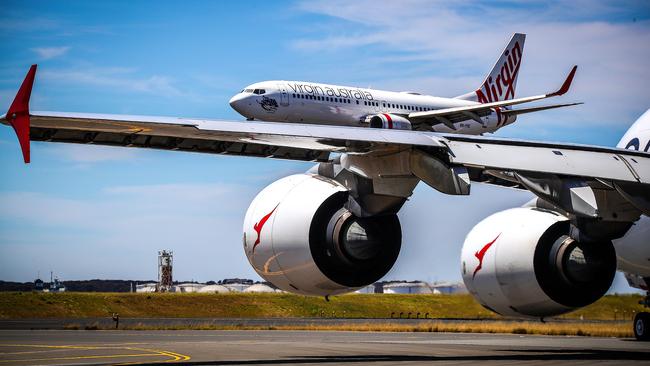Qantas, Virgin defend higher fares in the wake of Rex’s exit from domestic trunk routes
A 12 per cent jump in domestic airfares since Rex bowed out of major city routes has been attributed to ‘seasonal factors’ and flawed data collection.
Qantas and Virgin Australia have denied raising fares since Rex bowed out of domestic trunk routes, saying any increases were seasonal or a reflection of a flawed data collection process.
The monthly domestic airfare index compiled by the Bureau of Infrastructure, Transport and Regional Economics (BITRE) showed both discount and flexible economy fares were up 12 per cent in September compared to July.
The increase meant travellers were paying about $170 for fares which were $150 two months earlier, or $400 for a fare previously $350.
Rex went into administration on July 30 with debts of $500m, and permanently grounded its major city services the day after.
Qantas flatly rejected it was seeking to exploit the exit of Rex by raising fares, saying the BITRE data “did not represent average fares which customers were paying to fly domestically”.
Virgin Australia also denied it had hiked fares, suggesting there was always a variance in prices from July to September because of school holidays and footy finals.
However, the BITRE data showed last year discount fares increased just 5 per cent in the same time period, and flex fares rose a mere 0.2 per cent.

According to the methodology on the BITRE site, the fares represented in the index were the lowest available on airline’s websites three weeks before the last Thursday in the month.
Furthermore, fares across a total of 70 domestic routes were used for the index.
“The series is a price index of the lowest available fare in each fare class, weighted over selected routes,” said the federal government site.
“It does not measure real airline yields, or average fares paid by passengers.”
Both Qantas and Virgin Australia said their own data showed airfares had been fairly flat since April compared to last year, and were even lower when adjusted for inflation.
“Virgin Australia remains focused on providing exceptional value and choice to Australian travellers,” said an airline spokeswoman.
“We continue to offer frequent sale activity where customers can pick up great value fares.”
A Qantas spokesman also pointed to “regular sales” as helping to make travel more affordable for customers.
“Jetstar is offering $67 fares between Melbourne and Hobart while Qantas has fares for $139 between Sydney and Ballina,” he said.
The Australian Competition and Consumer Commission has warned the powerful airline duopoly it would be watching their behaviour closely following the failure of Rex and said “any increase in prices” were of concern.
Both airline groups face significant cost pressure in coming years as a result of new aircraft deliveries and new pay deals (for pilots at Virgin Australia and for cabin crew at Qantas).
A “same job, same pay” agreement reached with the Flight Attendants Association of Australia was expected to cost Qantas around $130m, which CEO Vanessa Hudson suggested would put upward pressure on international fares.
Virgin Australia was also facing a significantly larger bill for its pilots, in the event they accepted a deal which promises a 21 per cent pay rise over three years, including 15 per cent in the first year.






To join the conversation, please log in. Don't have an account? Register
Join the conversation, you are commenting as Logout